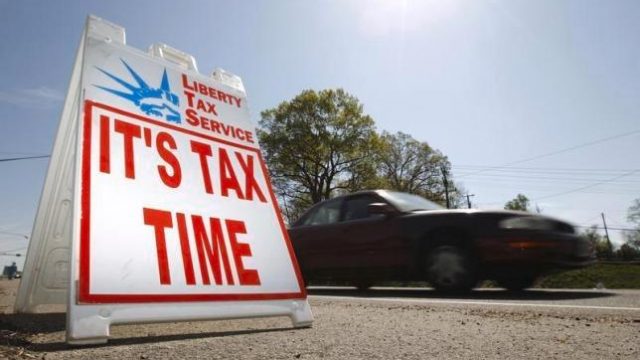John Andrist: Understanding What We Pay Taxes For

A car passes a sign advertising tax return services in Falls Church, Virginia April 8, 2010. REUTERS/Kevin Lamarque
It’s a rare person who loves to pay taxes.
But understanding the systems seems to help mollify me. Take real estate or property taxes, for instance. That’s the one we seem to hate the most.
Partly, I think, most of us pay it in one chunk, unlike income taxes and sales taxes. So it can sting.
It’s interesting, I think, that we generally think of shopping in the city as thrifty — a place to save money. I don’t think that’s true.
We may save a little money seeking out grocery specials and big box stores. But most services cost substantially more. And real estate taxes are substantially higher.
Part of the trouble is, most city folks like to play with them, give breaks to some folks, which others have to make up.
For instance, most cities give tax moratoriums to new home builders — usually a couple years, sometimes up to five.
The theory is when somebody builds a home for $400,000 to $500,000 it’s good for “our city.” But the process involves everyone else paying a little bit more. That’s not entirely fair to a guy who can’t afford fancy new digs.
[mks_pullquote align=”right” width=”300″ size=”24″ bg_color=”#ffffff” txt_color=”#000000″]Doug Burgum, a wealthy candidate for governor as a conservative, has a huge office tower on the drawing board here in Fargo to be at least partially financed with TIF funding. (i.e. tax exemption). It may be a good way to promote city growth, but you know you are buying a piece of those properties when you write a check for your own taxes.[/mks_pullquote]
Business taxes are a much bigger deal. TIF districts, for instance. The large Radisson hotels in both Bismarck and Fargo are subsidized that way. They pay almost no taxes to support schools and park boards and county government.
Their parent cities put up the capital for the projects by selling bonds, and the projects pay back a tax equivalent to pay off the bonds in lieu of taxes.
In Bismarck they have gone even further. After the bonds were repaid the hotel didn’t go back on the tax roles. Instead the district kept it going to fund other downtown projects.
Doug Burgum, a wealthy candidate for governor as a conservative, has a huge office tower on the drawing board here in Fargo to be at least partially financed with TIF funding. (i.e. tax exemption).
It may be a good way to promote city growth, but you know you are buying a piece of those properties when you write a check for your own taxes.
Same thing with renaissance zones and tax buy downs for new business ventures. Cities regularly buy into those in today’s world.
The legislature also plays a role. While property taxes are the exclusive tool of local communities, the state is not bashful about passing out property tax incentives, as well as numerous incentives to reduce their own sales and income tax revenues.
Full disclosure requires me to admit I have supported some of them in my legislative career. Individually they don’t amount to that much, but collectively they represent a pretty good kick to your total tax bill.
In the legislature we call it voting while you hold your nose. Sometimes you feel compelled to do it.
All those tax breaks deserve more legislative scrutiny. We’ve learned that ethanol manufacturing creates more greenhouse gas than it saves, but we still subsidize them — and also the product we buy at the pump.
A large steak house in Crosby burned last week. It was a devastating loss. I’m hoping they can rebuild, and I guess I would support using a tax buy down, a TIF district or some other tool to help them.
I’ve never been one of those real estate tax critics, although landowners arguably pay a disproportionate share, because of the nature of their business.
But in all things it is best to instead of just paying and complaining, we try to better understand the gifts and the warts that our tax systems create.
Health care excess
Medical care, and insurance to pay for it, is a whole lot bigger concern than taxes for American families these days.
I don’t think the core problem is Obamacare, although that certainly has done nothing to improve things.
The largest structure in North Dakota — half a billion dollars– is being built in Fargo by the largest medical provider in the Dakotas.
It’s not about necessity. They have buildings all over the place. But the more they spend, the larger their reimbursement.
A friend of mine made a trip to a Sanford emergency room recently on a busy night, waiting over three hours, then leaving without getting any help. So he went to another facility and got it done for $400.
But Sanford found him for the $2,000 charge. They win because they are smarter than our system.




